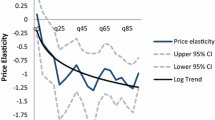Abstract
State monopolization or taxation aresupposedly justified because of negativeexternalities from alcohol consumption, butrecent research questions the efficacy ofsuch policies, suggesting that their actualgoals may be revenue-generation.Consideration of this hypothesis isfacilitated by estimates of the implicittaxes charged in monopoly states, whichgenerally are substantially higher thantaxes in non-monopoly states. Evidencethat monopolization and high taxes do notaffect the level of externalities is alsoexplained by adjustments that rationalindividuals make to avoid the consequencesof such policies, thus providing furthersupport for the revenue-maximizationhypothesis.
Similar content being viewed by others
References
Barzel, Y. (1989). Economic analysis of property rights. Cambridge, UK: Cambridge University Press.
Benjamin, D.K. and Anderson, T.L. (1996). Taxation, enforcement costs, and the incentives to privatize. In T.L. Anderson and P. J. Hill (Eds.), The privatization process: A worldwide perspective, 39-54. Lanham, MD: Rowman & Littlefield.
Benson, B.L. (1990). The enterprise of law: justice without the state. San Francisco: Pacific Research Institute.
Benson, B.L. (1995). Understanding bureaucratic behavior: Implications from the public choice literature.Journal of Public Finance and Public Choice 8: 89-117.
Benson, B.L. (2002). Regulatory disequilibrium and inefficiency: The case of interstate trucking. Review of Austrian Economics 15: forthcoming.
Benson, B.L. and Johnson, R.N. (1986). The lagged impact of state and local taxes on economic activity and political behavior. Economic Inquiry 24: 389-402.
Benson, B.L., Mast, B.D. and Rasmussen, D.W. (1999). Deterring drunk driving fatalities: An economics of crime perspective. International Review of Law and Economics 19: 205- 225.
Benson, B.L., Mast, B.D. and Rasmussen, D.W. (2000a). Can police deter drunk driving? Applied Economics 32: 357-366.
Benson, B.L., Rasmussen, D.W. and Zimmerman, P.R. (2000b). The impact of alcohol control policies on the incidence of violent crime. Report submitted to the National Institute of Justice regarding Grant No. 1999-IJ-CX-0041, October.
Cheung, S.N.S. (1974). A theory of price control. Journal of Law and Economics 17: 53-72.
Dee, T.S. (1999) State alcohol policies, teen drinking and traffic fatalities. Journal of Public Economics 72: 289-315.
Hayek, F.A. (1973) Law, legislation and liberty, Vol. 1. Chicago: University of Chicago Press.
Johnson, R.N. and Libecap, G.D. (1994). The Federal Civil Service System and the problem of bureaucracy. Chicago: University of Chicago Press.
Mast, B.D., Benson, B.L. and Rasmussen, D.W. (1999). Beer taxation and alcohol-related traffic fatalities. Southern Economic Journal 66: 214-249.
Nelson, J.P. (1990). State monopolies and alcohol beverage consumption.Journal of Regulatory Economics 2: 83-98.
Rasmussen, D.W. and Zuehlke, T.W. (1990). Sclerosis, convergence, and taxes: Determinants of growth among the US states. Environment and Planning C 8: 1-11.
Sass, T.R. and Saurman, D.S. (1993) Mandated exclusive territories and economic efficiency: An empirical analysis of the malt-beverage industry. Journal of Law and Economics 36: 153-177.
Simon, J.L. (1966). The economic effects of state monopoly of packaged liquor retailing.Journal of Political Economy 74: 188-194.
Yandle, B. (1989). Bootleggers and baptists in the market for regulation. In J.F. Chagrin (Ed.), The political economy of government regulation, 29-53. Boston, MA: Kluwer Academic Publishers.
Young, D.J. and Bieli´rska-Kwapisz, A. (2002). Alcohol taxes and beverage prices. National Tax Journal 55: 57-73.
Young, D.J. and Likens, T.W. (2000). Alcohol regulation and auto fatalities. International Review of Law and Economics 20: 107-126.
Author information
Authors and Affiliations
Rights and permissions
About this article
Cite this article
Benson, B.L., Rasmussen, D.W. & Zimmerman, P.R. Implicit Taxes Collected by State Liquor Monopolies. Public Choice 115, 313–331 (2003). https://doi.org/10.1023/A:1024240400780
Issue Date:
DOI: https://doi.org/10.1023/A:1024240400780




